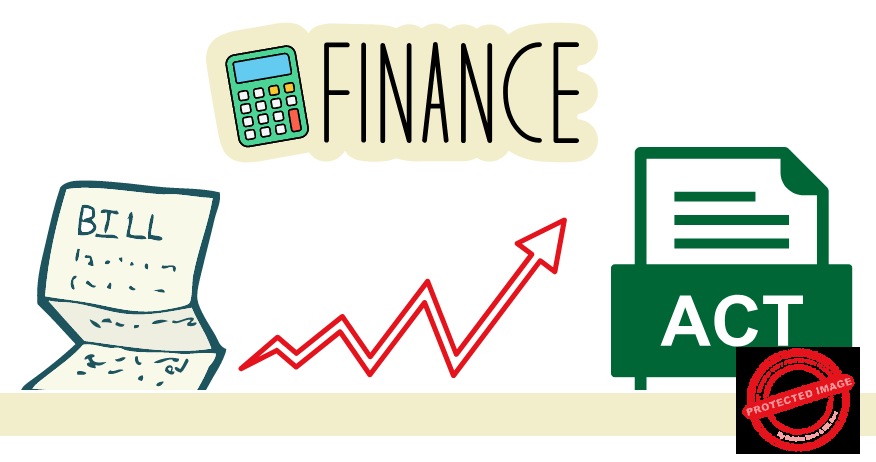A Finance Bill is a proposal of the various changes that the government intends to make to existing laws for various reasons, for example, to broaden the tax base. The Finance Bill will go through various stages to become the Finance Act, which is an Act of Parliament.
Table of Contents
In the following sections, we will walk through the process from the Finance Bill to the Finance Act.
The Finance Bill
Every year, the government prepares the Finance Bill and makes it available to the public. The document contains various proposed changes to the laws that are used in the financial management in the country.
In most cases, the Finance Bill will contain changes to the laws for:
- Income tax
- Value Added Tax
- Excise duty
- Tax procedures
- Administration of tax
- Miscellaneous issues
The Finance Bill has amendments or changes to existing finance laws. The document will have some of the following:
- Additions to existing sections of the law.
- Removal of sections from current law.
- New sections to be added to current law.
The Finance bill will also have the proposed effective dates. These are the dates when the law will take effect. The dates can be:
- Immediately after the Finance Bill becomes law subject to existing laws.
- A date in the future.
The Process from Finance Bill to the Finance Act
For any bill to become an act of Parliament that is the law, it must follow a process. All the three arms of government must be involved.
Parliament
- The National budget including the Finance Bill is presented to the people’s representatives – parliamentarians. This is done during the national budget reading day.
On that day, the following is presented:
a. The country performance in the previous financial year – growth, inflation, revenue collected, revenue use, etc.
b. The budget for the coming financial year – what is going to be done and how much it will cost. The presented budget amounts are often higher than the previous year’s budgets.
A budget has details about what will be done, how much it will cost, and the sources. Many times, there is a deficit. That is the difference between the revenue amounts the government is sure of collecting from projections based on previous years’ revenue collection and the amount required.
c. Revenue raising measures – where the money for the budget will come from – tax, loans, donations, selling of assets, etc. to enable the government to conduct its affairs in the next financial year.
- The Finance Bill is presented in parliament to the members of Parliament (MPs) alone in the 1st reading. Thereafter, the MPs will go into various groups to discuss the budget including the Finance Bill.
3. The Finance Bill is presented in parliament to the MPs in the 2nd reading. The MPs present the results of their budget discussions.
The results of their meetings will be on:
a. Any additions to the issues in the Bill
b. Any subtractions from the issues presented in the budget.
c. Any recommended changes to the issues presented in the budget;, for example,, the finance bill can propose the effective date to be immediate, while the MPs can propose a later date.
Parliament will accept the results or will recommend more work to be done. Once parliament is satisfied, the Bills can move to the next stage.
The Executive
4. Whatever is agreed upon is taken from Parliament to the Executive. It is presented to the President for assent.
The following will happen:
a. The president is happy with the whole document – assents by signing it.
b. The president is happy with the part of the document – does not assent to it and will send it back to parliament.
After the president assents to the bill by signing it, it is no longer a bill but a document ready to be published as law.
Judiciary
- After the assent by the president, the document is presented to the Judiciary to be published as an Act of Parliament and it becomes law. The Finance Bill is now the Finance Act, an act of Parliament and it is law.
The Finance Act
The Finance Act is for one finance year until the next Finance Act is published. It details the laws in that financial year. That is why it has the year for example Finance Act, 2023.
The Act will have the following:
a. The dates when the various sections will become effective.
b. Any additions to existing sections of the law.
c. Words deleted for sections removed from the law.
d. New sections to the law.
What does it mean to Taxpayers?
A Finance Act is not like a Finance Bill. A Finance Act is law. The following are some of the effects of a Finance Act to taxpayers.
A taxpayer cannot be prosecuted under the Finance Bill but they can be prosecuted under the Finance Act.
a. The taxpayers will collect any new taxes introduced at the prescribed tax rates.
b. If the tax rates have been increased, the taxpayer will have to change the rates from the effective date.
c. For all the sections removed, the taxpayer will cease using those sections.
d. The taxpayer must keep the Finance Bills and Finance Acts for each financial year – the law is to a year.
Thank you for reading the post.
dr. wakaguyu W.K
For any questions, email taxkenya@gmail.com
Meanwhile ...







